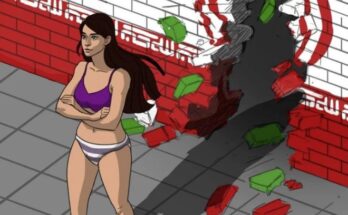Source: Iran International
By Maryam Sinaee

Government manipulation of information about the killing of teenage girls during protests and forcing families to make confessions, have outraged many in Iran.
Chief of the Alborz Province Justice Department, Hossein Fazeli, claimed Thursday evening that 16-year-old Sarina Esmailzadeh had jumped from a neighbor’s rooftop and killed herself and her death was unrelated to protests. “The deceased had a history of overdosing with pills to kill herself.”
Fazeli also claimed that Sarina’s mother, uncle, and young brother had gone to the prosecutor’s office to complain about the social media reports that said she had been killed in the protests.
Less than a day later, on Friday, state media released a video showing Sarina’s mother (now disputed by people who say she is not her mother but an actor) denying that her daughter was killed in the protests and saying she had a history of attempting suicide in what appeared to be an interview in which a reporter tried to lead her with his questions.
The 16-year-old YouTuber died on the way to hospital after being severely beaten in the head with batons at while protesting the killing of Mahsa Amini. She had joined a protest in Karaj, a large city half an hour from the capital Tehran, on September 21. Her injury and death were verified by Amnesty International.
Sources close to the family have said on social media that over 50 security forces were present at her funeral, presumably to prevent a protest, and did not allow anyone to take video at the cemetery. The reports say security forces removed all the photos and condolence messages on the wall of her home only a day after Sarina’s funeral. They also say the family have not been allowed to hire a lawyer and are under pressure to say she committed suicide.

But few may believe the official account of the happy, intelligent, social-media savvy young girl’s death, or even the purported “confession” of her mother, after seeing her daughter’s posts on social media before her death.
“You tell me not to swear profanities at the authorities? … How is it that suddenly a syndrome afflicts everyone to make them jump from heights to kill themselves?” one of the unbelieving Twitterati wrote quoting the judiciary official’s claims. He was referring to similar claims made about another teenage protester, Nika Shakarami, whose whole family have been under great pressure to deny her death in the protests.
Authorities claim Nika also jumped from a rooftop after taking part in protests on the same day that Sarina did. Nika’s aunt and uncle were both arrested earlier this week and forced to corroborate the suicide script.

Nika’s mother, Nasrin Shakarami, however, has bravely resisted all pressures. She told Iran International Thursday that the authorities’ claims were “ridiculous”. “It’s not the first time that they deny the truth.” According to her, not only her brother and sister but also some of her nieces and nephews are facing arrest. “There is no use talking to the authorities. They bully us and want us to repeat their account of the incident.”
Teenage girls killed by Iran’s security forces during recent protests represented some of the best among Generation Z, concerned about their society and their own future. “We all know what’s it like in Iran. What do people in any country want: welfare, welfare, welfare,” Sarina says in one of her videos but goes on to add that she and her generation have to worry about much more. “There are these restrictions for women, like compulsory hijab … We can’t even go to a stadium [to watch football],” she says after mentioning that the economy is in ruins.
Sarina, an accomplished student who spoke English and French, talked about her daily life, studies, and her aspirations in her social media posts. In one of her video blogs made during a visit to a historical mosque the youngster criticizes the government for failing to protect the country’s cultural heritage and highlights a graffiti, written by religious hardliners, that says women best stay at home and raise children.
In a video she is seen in a car singing along to Hozier’s Take Me to Church. ‘My homeland feels like being in exile,” her last post before going to the protests on her Telegram channel said.
Iran’s Supreme Leader Ali Khamenei in his first reaction to the ongoing unrest Monday blamed the United States and Israel for ‘plots’ and said the youth were drawn to the streets as a result of what they saw on social media. “With some punishment such people can be made to understand they are mistaken,” he said.
“This generation who are leading everyone now were raised by millennial mothers whose rights and feelings were constantly trampled upon by their families, schools, and the society,” another Twitterati wrote, suggesting that the millennials who were better aware of their rights raised their children not to relent to the same pressures.
Nothing displays the rebelliousness of Generation Z in Iran better than a video that went viral on social media last week. In the video protesting girls who have ditched their headscarves in a secondary school in Karaj, the same city where Sarina lived, are seen kicking out an education ministry official who came to threaten them with expulsion and convince them to “behave themselves”.




